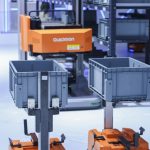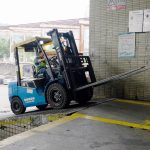Ecommerce over the last three years has become one of the fastest-growing sectors within the supply chain. With this growth, businesses faces a number of challenges, not just scaling up the operation to cope with demand, but also investing in equipment that can adapt as the process changes and improve the operation to make savings wherever possible.
The right warehouse fulfilment plan will not only improve productivity but will also make the whole operation more efficient. However, any plan has to take into account a number of factors.
Without the right equipment designed for your applications to help achieve the above, implementing the right WMS, tackling productivity or perhaps outsourcing the picking to a 3PL can’t be looked at until the hands-on picking operation is defined, yet in many cases businesses will look at off-the-shelf solutions instead of a tailor-made solution that’s not only right for the current process but can adapt as and when the fulfilment process changes in the future. In many cases, this can also take place towards the end of the planning process.
When we look for IT solutions such as WMS or even the building we occupy, how often is the right solution available without some changes? But, more importantly, how often are today’s requirements the same as those two or even three years ago?
Obviously one of the most important areas we have to consider is order fulfilment, what impacts our output and how this can be improved. Can time be saved in certain areas, and thus reduce waste (time or material)? Aside from the equipment used, the wellbeing of staff has to be a key consideration. After all, a happy worker is a productive worker.
Speaking to a wide range of retail companies, any improvement can be key to achieving profitability; in some cases, saving just two seconds on a picking operation can have financial benefits to a business. Obviously, this is dependent on the number of picks carried out, but how many businesses do not want to grow?
Right Equipment for Ecommerce
So what items of equipment can we identify as the ones that will require the most changes over the years and what are the factors influencing change? Take, for instance, a picking trolley; how difficult is it to move when fully loaded, how does this impact on pick route times, can the picker load all product onto the trolley, are the shelves at the right height, is the handle to move the trolley at the right height for the operator, does the picker need steps to pick items occasionally…?
Picking/packing stations: how many are required to complete the process? PC, label printer, boxes, envelopes and protective packaging. How long will the operator have to stand at the station? Is the work surface the correct height, and are all the items within easy reach and easy to locate?
Custom-built solutions designed to take the all the above into account are the obvious solution to answer many of these questions. In response to the question “are they expensive compared to off-the-shelf?” the quick answer is yes. However, when you look at a flexible solution that can adapt as your process/workload changes, the ROI is unquestionable. With so many businesses having to either make do or – worse still – scrap their equipment and start again, it does make custom flexible solutions the unequivocal solution to the issues faced, not just in Eprocurement order fulfilment, but also the far wider order picking market place.
Flowstore offers a wide range of custom-built applications into market sectors looking find the right solution that will stand the test of time and adapt as the demand on the supplier changes with the market place. Put simply, it says its provides “smart solutions that work” with a dedicated team who will visit your site, understand your processes, and try to offer the best solutions.
The post Improving Manual Ecommerce Picking appeared first on Logistics Business® Magazine.


